Crypto or Fiat Currency: It's All About Trust
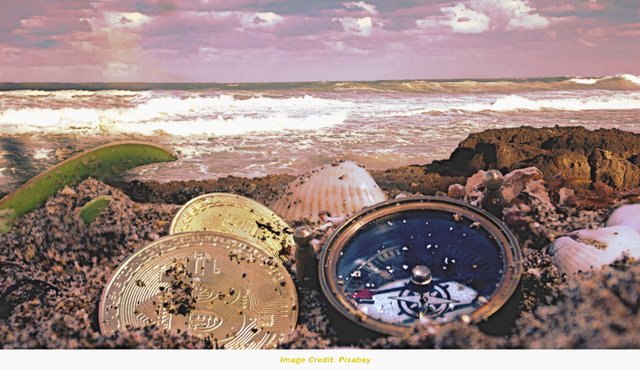
In 2008 Satoshi Nakamoto 1 published a whitepaper, Bitcoin: A Peer-to-Peer Electronic Cash System, in which he describes a new sort of currency. The first sentence of the paper contains the word 'trust'. 'Trust' appears again in the second sentence, and yet twice more in the first paragraph of Nakamoto's whitepaper. It's obvious that trust is central to Nakamoto's vision of cryptocurrency. This makes sense, because trust is central to the viability of all currency.
Shells as Currency
Shell money from the Solomon Islands. This traditional form of money is being supplanted today by cash in many places, but it is till an important part of the culture in the Solomon Islands. The image is used under a Creative Commons Attribution Share Alike 3.0 International license. The picture is attributed to Claus Ableiter nur hochgeladen aus enWiki
It's a Matter of Trust: Yap Stone Money
An article in ABC Science, by Karl Kruszelnicki (University of Sydney, Australia) illustrates how trust is an essential characteristic of money. Dr. Kruszelnicki describes the currency of the Yapese, a people who inhabit four islands in Micronesia. Yapese currency is comprised of stones quarried from distant islands and transported by canoe back to Yap. Part of the value of the stone is the difficulty that has to be overcome in order to acquire it. The stone doesn't actually change hands when it is used to purchase a commodity. Everyone on the island knows when a transaction has taken place and they know the terms of the transaction. No matter the physical location of a stone, everyone knows who owns it. This transaction history becomes part of the collective memory of the Yapese people. The stone has value because people agree that it does. It is in this communal agreement that people place their trust. This monetary system has worked on Yap for hundreds of years.
A picture of stone money on Yap. The image is used under a Creative Commons Attribution Share Alike 3.0 International license and is credited to Peter2pan.
An Assessment of Bitcoin From the Chair of NYU Business School
In doing research for this article I came across divergent opinions about cryptocurrency, and Bitcoin in particular, from 'experts' in the academic and economic communities. One skeptic of Bitcoin, David Yermack, writing in MIT Technology Review, asserts that the currency is not truly money. He makes this claim in an article entitled, Bitcoin Lacks the Properties of a Real Currency. Dr. Yermack explains that a major defect of Bitcoin is that "It cannot be deposited in a bank".. If we are to use Dr. Yermack's theory of money, then we cannot consider Yap stone money to be a true currency. Because a Yap stone cannot be deposited in a bank. But, despite Dr. Yermack's reservations, Yap stone money functions fully and reliably as currency. It does so because people trust it. This is the ultimate test of money. If people agree it has value, then it does. Once trust in a currency is lost, then so is the value.
Financial Crisis in Germany, 1931
This picture shows people trying to get money out of a Berlin, Germany bank, in 1931, during a financial crisis.. That year, not only the German mark collapsed, but there were runs on banks in the UK and the US. Image Credit: Bundesarchiv, Bild 102-12023 / Georg Pahl / CC-BY-SA 3.0. Used under a Creative Commons Attribution-Share Alike 3.0 Germany license.
International Monetary Fund Defines Money
In 2012, the International Monetary Fund published an article entitled, What Is Money? The IMF's definition of money is a little broader than Dr. Yermack's. According to the IMF, money has three essential qualities--all of which may be found in Yap stone money:
- Money has to be something that stores value.
- It has to be something by which value can be measured, by which an account may be given.
- And people must be able to use the currency as a medium of exchange.
Please note: The IMF does not include the necessity of bank deposits in its definition.
At one point in its article, the IMF wraps up the discussion about the essential nature of money in one sentence: "Money works because people believe that it will". In other words, money works because people trust it.
The Cross of Gold Speech
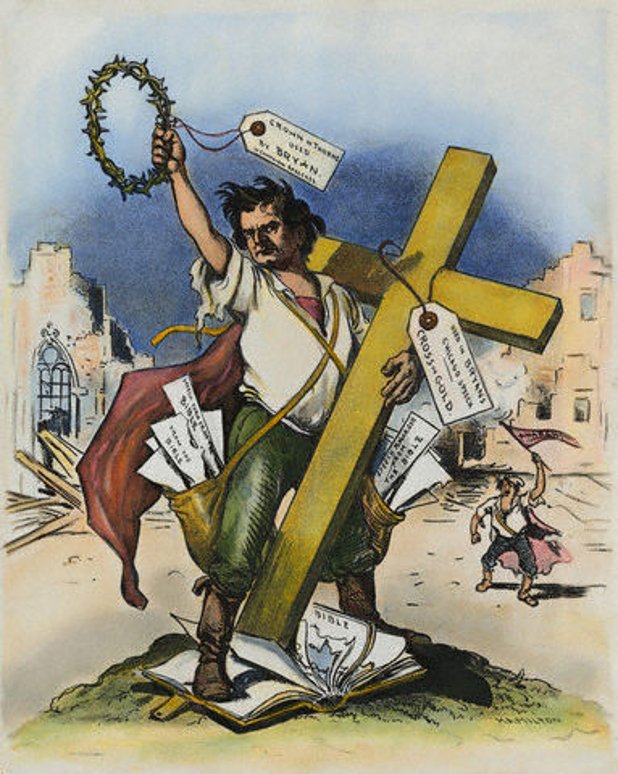
This cartoon was drawn by Grant Hamilton and appeared in Judge Magazine, 1896, and is in the public domain. The picture shows William Jennings Bryan, aspiring presidential candidate. Bryan became famous for his Cross of Gold Speech. In the speech he claimed farmers and debtors in the US were being sacrificed for banking interests. Bryan wanted silver and gold to be used to back the US dollar. Bankers and investors wanted just gold. Gold advocates carried the day when Grover Cleveland became president.
Adam Smith and Burying Wealth
Adam Smith wrote probably the most famous and influential book on modern capitalism: An Inquiry into the Nature and Causes of the Wealth of Nations. In one section of the book, Smith considers how citizens try to preserve wealth in times of instability. He describes efforts "in those unfortunate countries...where men are continually afraid of the violence of their superiors". In that situation, people fear they won't be able to get their hands on their money, and so they always want to "have it...at hand, to carry with them to a place of safety". They live in such fear that it became common practice to "bury and conceal a great part" of their wealth.
Gold Unearthed in a Feudal Treasure-Trove
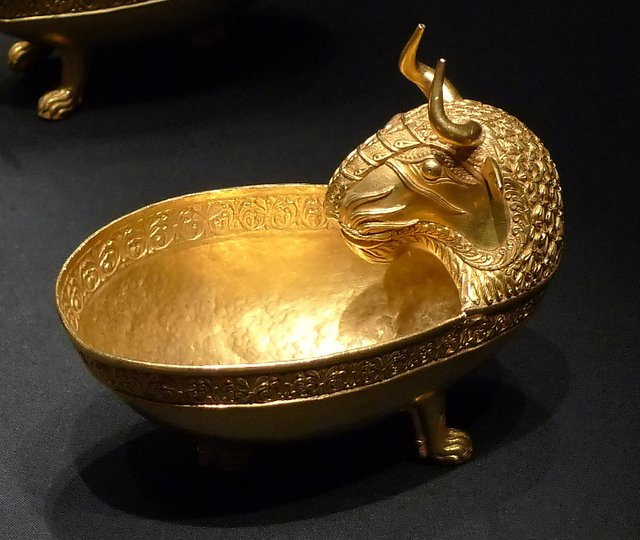
In 1799 buried treasure was discovered in an area that is today western Romania. Twenty-three vessels dating back to the Early Middle Ages were unearthed. The provenance of the items remains a mystery, and specific reasons for burial are also unknown. Image attribution: by Sandstein. Used under a Creative Commons Attribution-Share Alike 3.0 International license.
Smith describes the insecure countries he knows about in his lifetime, and he refers to the past, to feudal time in Europe, when people did not feel safe. He describes the "treasure-troves" that could be found underground, where people had placed their goods in fear. These buried stores were so common during feudal times, that, according to Smith they represented a significant "part of the revenue of the greatest sovereigns in Europe". Smith goes on to explain that whenever this treasure was unearthed, ownership of the trove often fell to the sovereign.
Thus Smith addresses an important aspect of trust and currency. Not only does currency need to have agreed upon value, but it also must be accessible. As is illustrated in one of the above pictures (showing people trying to get into a Berlin bank), getting your money can be challenging in certain circumstances.
Hyperinflation in the Soviet Union
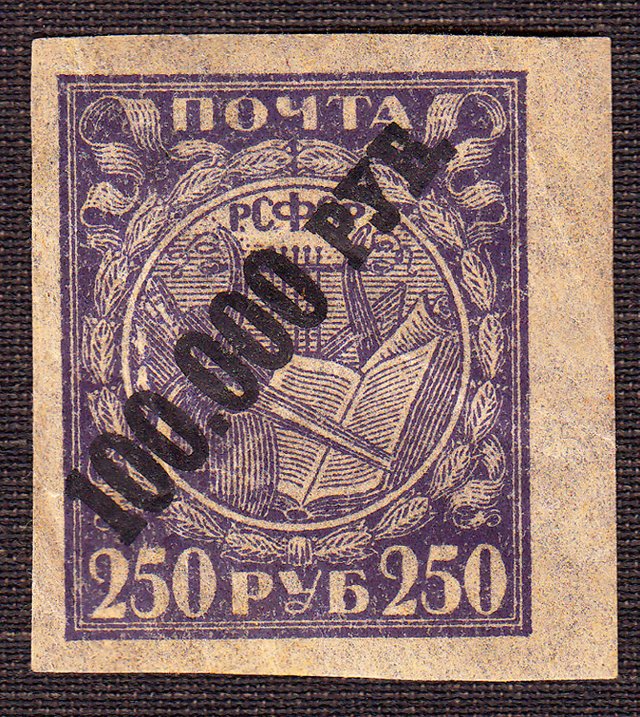
After the Russian Revolution of 1917, Russian currency went through a period of hyperinflation. The image above shows a postage stamp that was supposed to cost 250 rubles, but was actually going for 100,000--the effect of hyperinflation. It is often the case that, when governments undergo radical change, such as revolution, faith in the currency collapses and money becomes essentially worthless. This image is free of copyright restriction "according to article 1259 of Book IV of the Civil Code of the Russian Federation".
Paul Krugman' Exception
The IMF, the YAP people, and Adam Smith come from dramatically different cultural perspectives, but they agree about the one thing that gives money value: trust. This assessment of the essential quality of money is in contrast to a view put forth by Nobel-Prize-winning economist Paul Krugman. In a 2014 New York Times column entitled, Adam Smith Hates Bitcoin, Krugman explains why Smith would not approve of Bitcoin.
Smith, according to Krugman, held gold and silver (as currency) in low regard because mining the metals consumed "real resources". Bitcoin, Krugman points out, likewise consumes real resources--an enormous amount of electricity. Krugman makes a good point here, and this is one of the most serious charges leveled against cryptocurrency.
A mining farm in Iceland. The picture is attributed to Marco Krohn and is used under a Creative Commons Attribution-Share Alike 4.0 International license.
However, after Krugman has made his good point, he rests his case. This Nobel-Prize-winning columnist does not go on to address the raison d'être of Bitcoin, (as laid out by Nakamoto in his whitepaper): the need for a more secure, efficient way of conducting transactions on the Internet: An Internet-based monetary entity with inherent trustworthiness.
Krugman's silence on the issue of trust is glaring because of the climate in which he published his Bitcoin column. Both Nakamoto's whitepaper and Krugman's essay were written at a time when the world's trust in the global economic system was shaken. As The Economist explained in a 2013 article, "Trust, the ultimate glue of all financial systems, began to dissolve in 2007 ". The international banking system failed. The Icelandic Krona lost so much value that it was no longer traded on currency markets. This is the environment in which Nakamoto's paper was published. And five years later, when Krugman wrote his column, the world was still recovering from the financial collapse. Yet Krugman never refers to the loss of confidence in fiat currencies or banks. The omission is inexplicable.
Nakamoto Explains the Need for The Blockchain
At the very beginning of his whitepaper, Nakamoto addresses the obvious question: why is there a need for an alternate payment system? He methodically and efficiently describes why he believes there is a need for a new system of payment transactions on the Internet. Summarized, this is his rationale:
Traditionally, institutions have acted as trusted third parties to validate transactions between two parties online.
Fiat currencies are produced at will, with no external controls.
Nakamoto addresses weaknesses in this traditional payment model:
a. In the trusted third party model, there are expenses associated with using the service of a third party (you have to pay the bank a fee). These expenses increase the cost of Internet transactions. This increased cost makes very small transactions impractical.
b. Because transactions are reversible in the trusted-third party model (that is, with a bank acting as an intermediary), a lack of trust spreads through the system. Merchants regard their customers with skepticism--because, obviously, they don't want to get stuck with a bad transaction. Fraud becomes an issue, and the cost of fraud has to be incorporated into a price structure.
c. It's impossible to use cash, which would solve the issues addressed in a. and b., because the transactions take place online.
d. There is a potential to print an infinite amount of units: inflationary potential is inherent in fiat currency.
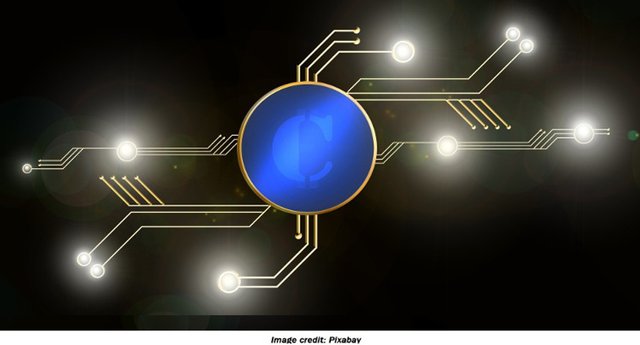
Nakamoto's solution, Bitcoin2, addressed all of these issues. He devised a cryptography-based currency, one in which the transparency of proof would impart trust, and one in which the design would make transactions virtually irreversible. The essential design of this new cryptocurrency would be to time-stamp each computation in each step of a transaction so that reversing the steps would be "impractical".
In order for this system to work and be 'trustworthy', according to Nakamoto, honest transactors would have to stay ahead of dishonest attackers. And, in order to do this, "honest nodes collectively" would have to "control more CPU power than any cooperating group of attackers".
Nakamoto goes on to explain in detail how blockchain (the series of time-stamped computations linked together chronologically) transactions would be verified. A good deal of detail is also devoted to describing how dishonest brokers would be thwarted by the dynamic of the blockchain, although Nakamoto does acknowledge that short-term, bad actors might be be able to get away with mischief.
Finally, the inflationary potential of fiat currency would be avoided because there is a finite limit to the number of Bitcoins that can be printed. Therefore, the value of existing coins cannot be diluted by the production of additional units.


When Satoshi Nakamoto published his whitepaper in 2008 he adapted traditional notions of currency to twenty-first-century technology. That was ten years ago. Today, the crypto market is no longer a novelty. Blockchain technology is attracting traditional investors, such as the Rockefeller family.. What will the next ten years bring?
1 Is Satoshi Nakamoto male or female? One person or many people? The name was chosen by the author of the whitepaper and the author is typically referred to as a male, so I follow that convention in this post.
2 Since Nakamoto wrote his whitepaper, other cryptocurrencies have grown up (including Steem). These have developed their own organizational ecology and ethos.
Some Sources Used in Writing This Post
https://blockonomi.com/who-is-satoshi-nakamoto/
http://www.wallstreettechnologist.com/2015/09/29/is-money-the-same-as-currency/
https://www.pacificartisan.com/single-post/2017/05/14/Shell-Money-Currency-of-the-Solomon-Islands-Ethical-Fair-trade-Jewellery
http://www.abc.net.au/science/articles/2016/06/21/4485466.htm
http://www.abc.net.au/science/kelvin/k2/aboutkk.htm
https://www.worldwildlife.org/ecoregions/oc0204
http://www.stern.nyu.edu/faculty/bio/david-yermack
https://www.technologyreview.com/s/524666/bitcoin-lacks-the-properties-of-a-real-currency/
https://link.springer.com/article/10.1007/s11698-007-0014-4
https://www.investopedia.com/terms/b/bankrun.asp
http://www.imf.org/external/pubs/ft/fandd/2012/09/basics.htm
https://www.history.com/topics/william-jennings-bryan
http://decodedpast.com/adam-smith-1723-1790-father-modern-capitalism/15048
http://www.thebyzantinelegacy.com/nagyszentmiklos
https://www.investopedia.com/terms/h/hyperinflation.asp
https://krugman.blogs.nytimes.com/2013/04/12/adam-smith-hates-bitcoin/
https://www.washingtonpost.com/news/worldviews/wp/2018/02/13/cryptocurrency-mining-in-iceland-is-using-so-much-energy-the-electricity-may-run-out/?noredirect=on&utm_term=.3e5fcaf83d0b
https://www.economist.com/schools-brief/2013/09/07/crash-course
https://www.theguardian.com/business/2008/dec/28/markets-credit-crunch-banking-2008
https://www.nytimes.com/2008/10/09/business/worldbusiness/09iht-icebank.4.16827672.html
https://www.investopedia.com/terms/f/fiatmoney.asp

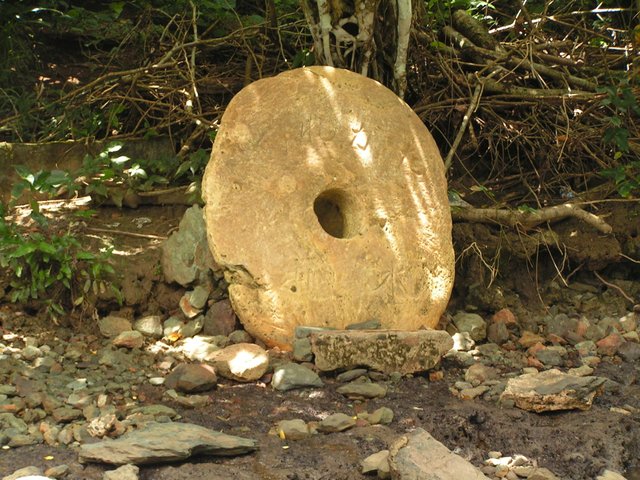
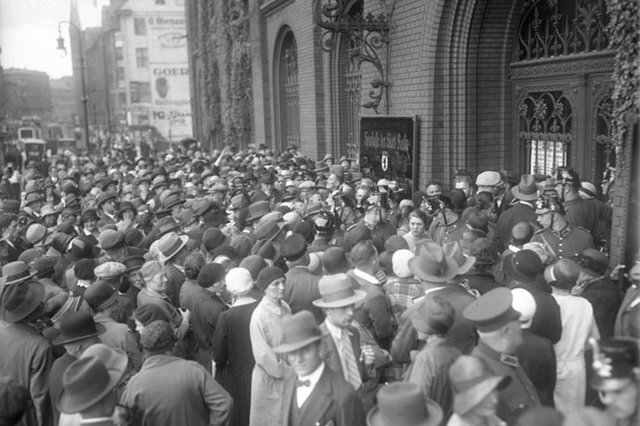
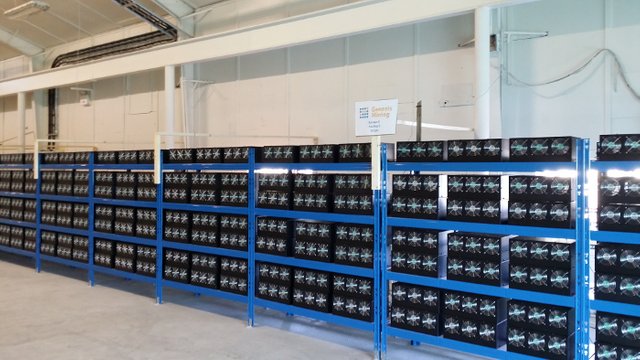
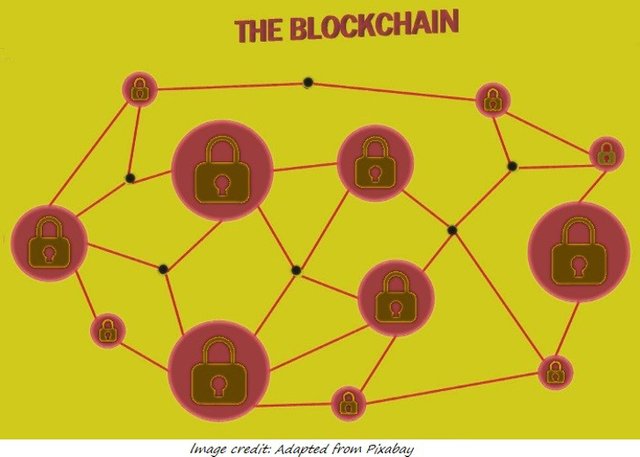
Great presentation! It is remarkable how a common agreement can regard almost anything as "money" and how this "agreement" has evolved over centuries and through different cultures.
You also reminded me of @iliasdiamantis' great series on the History of Money ( part 1 - part 2 - part 3 )
Oh, Thank you for sharing this here Ruth, I shall watch this series! :*
Thank you! I checked out that reference. It looks very informative. Tonight, when I'm resting in bed, I'll take my iPad out and read the series. I'm sure I'll learn a lot from @iliasdiamantis
The history part of this essay was relatively easy to master, but Nakamoto's whitepaper was a challenge. Was fun meeting that challenge. Glad I did.
Thanks so much for reading, and for commenting.
What an excellent article! Thanks for this.
Basically, it has always been a dance between trust and mistrust when it comes to currency. One could also say that it is about the human currency. I assume that there will always be another specific view on one particular view. This always remains the same.
What has changed, however, is the method and the order of magnitude in which trust or distrust can express itself. Virtual currencies - whether they are called Fiat or crypto money, they are basically the same - can nowadays be traded virtually outside the manifest physical world due to the speed of the Internet. Nevertheless, these movements have effects on the physical world, i.e. the lives of organic creatures, including humans. Entire economies are currently feeling this. Even though I don't like the word very much, I use it in this context.
The difficulty is that virtual money has no relation to matter, i.e. much more money circulates around the globe than there is material value in return. How do you create material value when everything physical is already labelled, evaluated and in someone's possession?
As I see it, an equivalent to material goods must be created: Virtual goods in a virtual world. So that all the money that came out of nowhere can continue to be used. Perhaps nothing critical about this would be to say if it weren't for the topic of power consumption - gigantic server rooms that make room for 24/7 online life, as you have quite rightly integrated here. Finally someone who seriously puts it into a scientific article! And virtual money is only fun (at least present and predominant) if it can be spent in the real world: What matters here is whether we want to spend it on unrestrained superficial consumption. Which is kind of weird when you think about it.
I therefore take the view that crypto currency should not basically be a global dominant currency, but should only exist in coexistence with a variety of currencies - something quite different than propagated by some who would like an earth dollar (I read here somewhere on the blockchain). I don't see much difference between Fiat and crypto currencies in principle.
Crypto currencies can be viewed like all objects. As soon as one reaches dominance over all others, diversity is endangered. As with bio-diversity: in humans, animals and plants, good mixing is needed to maintain a reasonably stable balance.
This is truly a matter that people find very difficult to control. They over- or understeer and the mechanism of balance could almost be described as mystical.
What is said about decentralization I understand in the context of localization. Actually, a good life concept would be to maintain one part virtual currency, one part subsistence economy, one part sharing economy and one part self-sufficiency. World trade would remain, but no longer in the monstrance of today.
One point I would like to add and which is critical. You said:
As we are in the beginning phase of cryptocurrencies being in use and this will increase there is still the question of anonymity. You might have heard of criminal elements who use blockchain-technology and bitcoins for tax evasions and other acts against law. Darknet & Darkweb-related stuff...
And a question of trust again: Do people believe in the finite amount of the cryptocurrencies? As there is still laying ahead the event when the pool is declared to be finished, no? Maybe some of the pros can shed some light on this question.
You address just about every question that arose in my mind as I researched this article. The idea of currency, once you get past bartering, becomes increasingly abstract, removed from the commodity. I think economics is a nebulous "science" precisely because so much of its theory is premised on how people act--and that is never a certainty. The more intellectual and abstract the discussion becomes, the less "real" it is and the less likely to be reliable. I am more a student of history than of science, so I tend to take the long view on currencies. They have never held up over time. They are a matter of faith, mostly. Even gold and silver have fluctuated wildly in value. So I view virtual currencies as I do all others--with a certain amount of wonder, apprehension and hope. I think I have more hope in the crypto than in the fiat because there's more chaos and therefore less predictable malfeasance. But that's just a guess. Very nice comment. Thank you.
I am happy you came up with this kind of topic in the way you did!
I'd say I do have hope in the variety of things, no matter how the currencies are named and traded. I like to bet on complementaries as well as on coexistence.
As a history student you know of the rise and fall of things.
We can only ever approach controllable conditions and methods/technologies, but never really produce them completely. Nakamoto's dream, like that of many individuals, to create something that is highly waterproof and makes distrust unnecessary, could also be understood as an effort born of distrust itself - I am curious if it was. What matters now is what the rest of us make of it. Everyone is involved in sowing trust or mistrust.
I really appreciate to be in touch with you.
It is a pleasure :)
This is a terrific valuable research, worth some columns in the Economist.. I need to read it with calm to fully appreciate it and I'm admired for the amount of references. Wow we're lucky to have such a clever storyteller writing with us in the Bananafish Realms!
Thank you! The other half of my personality--tenacious research. Steemit is a good outlet for that.
Excellent article! It's worth a note that the big American banks (the very relevantly named BoA is one example) have already started jumping on the Bitcoin bandwagon and are developing projects to essentially store bitcoin in lock boxes.
The Microsoft-backed, ICE/NYSE-derived exchange Bakkt plans to store their in big ol' "warehouses". So that's one argument against Bitcoin firmly squashed.
From the current developments one can estimate that Bitcoin will live on and prosper, perhaps as the new Digital Gold (to quote the creator of Litecoin) -- a less liquid store of value.
Personally, I'm not a fan:
It's a huge waste of resources and crypto tech has already surpassed it several times over! But it's the most recognized crypto brand and will probably remain as such for years to come. Viva Bitcoin!
Thanks for the info about the banks' "lockbox"--didn't know. And I agree with you about resources. I like the notion of a kind of counter-culture currency, but not one that uses tons of fossil fuel energy.
Finance is not my strong suit, but I took this subject on because I wanted to know more. Taking a historical perspective, the long view, is usually a good way for me to get a handle on trends. I'm not sure I have that handle, but I do know more now than when I started researching this essay.
Appreciate your comment. You seem to know a lot about currency, so I'll keep my eye on your blog :)
Personally I find that having at least some historical perspective in Economics and Culture is vital. Why, the result of yesteryear's meteoric rise in Bitcoin followed historic bubble patterns to a T.
History will remain a powerful indicator of future events because it's an indicator of human behaviour. Many parameters in our fluctuating environment influence these events, but it seems our biological cognition has not significantly advanced throughout recorded history.
Thank you for the follow, though I must admit that I have no experience in writing articles and some trouble putting meaningful structure to the chaotic buzzing in my mind, so I've not managed even a self-introductory post just yet. But quality blogs like this one inspire me to at least attempt something.
One word of advice: don't get discouraged. The first couple of months I wrote some great blogs and got $0.00 payout. Eventually, things picked up. The joy of writing and researching kept me going.
I appreciate your kind words. As for the chaotic "buzzing" in your mind--that's just neurons firing. Inspiration comes from that. Writing things down, in my experience, helps to make sense of it all.
Good luck.
I have written on very similar before trying to explain that very very few things we think have some intrinsic value is only have situational or subjective value, the video game Fallout uses bottle caps as currency in a post-apocalyptic world which makes no sense to us but does in a world where they become scarce.
Yes, perspective and experience determine meaning. I do want to add a bit to your hypothetical 'genius' search. I'm always acutely aware that I can write an essay like this, do the research and understand it, because I was given a good education. In my case, that was never guaranteed. The public library played a large part in my education and a generous scholarship covered my university expenses. These gifts changed my life. So, for me, your 'genius' search, which would open doors for many who are not geniuses (I certainly was not!)--that seems like a great thing.
Thanks for reading and commenting :)
A very well written and informative article @agmoore, well done!
There a small typo at the below point if you would like to correct it :)
Thank you so much. Your suggestions is gold (Ha ha). I was briefly a proofreader, years ago, so this sort of error matters to me. Usually, a few days before payout, I comb through an article to look for errant crumbs so I can brush them out before the article is cemented on the blockchain.
Appreciate your kind comment and sharp eye.
This post has been voted on by the steemstem curation team and voting trail.
There is more to SteemSTEM than just writing posts, check here for some more tips on being a community member. You can also join our discord here to get to know the rest of the community!
Thank you, steemSTEM! I'm beginning to feel as though I'm part of the community, even though I lack many 'science' skills. When I write a science post now, I have certain objective standards that I keep in mind. Also, posts by other steemSTEM writers have inspired at least a couple of my essays.
So, thank you for today's endorsement and for the positive role you've played in the development of my blog.
This is an incredibly well-presented post @agmoore :)
"It cannot be deposited in a bank" Oh no Dr. Yermark, what a simplistic way of viewing money. I wonder if this is something my late granddad would say!🙄
Some of your description under the heading Adam Smith, brings to mind the current reality of Venezuela. Also, it explains a lot of folk tales, from my country, of people who buried their money for so long that in the end, it either lost value or decomposed. While these tales have a comedy purpose they do reflect the fear and luck of trust people felt towards the system :/
Now, on to read that article published by the IMF that you shared here :)
Thank you for taking the time to put this amazing article together and share with us here. I will send it to a few people too!!
Best :)
Thank you so much! I had Venezuela partly in mind when I wrote. Spanish (trying to read it, speak it) is one of my hobbies so I read posts by Venezuelan steemians.
Interesting that you mention your grandfather. Mine lived through the Great Depression in the US. He was a farmer and apparently came close to losing everything. He refused to deal with banks when I was a child. I remember he bought a house, and 10 acres, for cash. I think his aversion to banks led to a certain amount of disarray for his heirs. Of course, all of this was family legend, but the thing that stuck in my mind was his suspicion of banks.
Writing this post was fun, and also a learning experience. That's the best part of blogging, the things I learn--and the people I "meet".
Appreciate your reading and commenting!
Hi @agmoore!
Your post was upvoted by utopian.io in cooperation with steemstem - supporting knowledge, innovation and technological advancement on the Steem Blockchain.
Contribute to Open Source with utopian.io
Learn how to contribute on our website and join the new open source economy.
Want to chat? Join the Utopian Community on Discord https://discord.gg/h52nFrV
Thank you, utopian-io! I really enjoyed learning and writing about the blockchain concept.
I very much appreciate your endorsement.
This is really interesting. Maybe more interesting seeing as an hour ago I was quizzing a friend about where the value of Steem comes from and she explained that Steem has value because we say it does.
Then I'm browsing around and find this. Coincidence? Definitely.
I wondered myself. It's not something you can really wrap your mind around. Makes you want to bury gold in the back yard, doesn't it?
Thanks for reading, and commenting. Be seeing you around Steemit, no matter the price. I like to blog.
Me too. It's definitely not for the money.
I look forward to it. Do you go on Discord? Every Thursday a great group of folks get together for a curation show called Pimp Your Post Thursday where you get a chance to talk about a post of yours, or someone else's that you like and you can check out other's posts that interest you. If I get a chance while I'm at work, I'll share this one. It might be past voting by then, but at least the curators will get a chance to read it.
I get a little confused on Discord. All that chatting. I lose track of whose talking and whose turn it is. I'll check it out, but will probably get confused, as usual. Thanks for the invite. I will definitely be checking out your posts.
Well, they are a pretty good, laid-back group. You don't have to talk either. You can put in a paragraph with your link and @shadowspub will read it out. Anyhow, here's the link to the Ramble Discord if you want to check it out.
https://discord.gg/jtZmJt4
There are a few different shows on there and once a month there is a witness chat.
Come on over... like @granolalight has said... we're pretty laid back especially with new people. I haven't bitten anyone.... yet.
OK--I'll come by as a tourist to watch and listen. At first at least. Can't resist two gracious invites :)